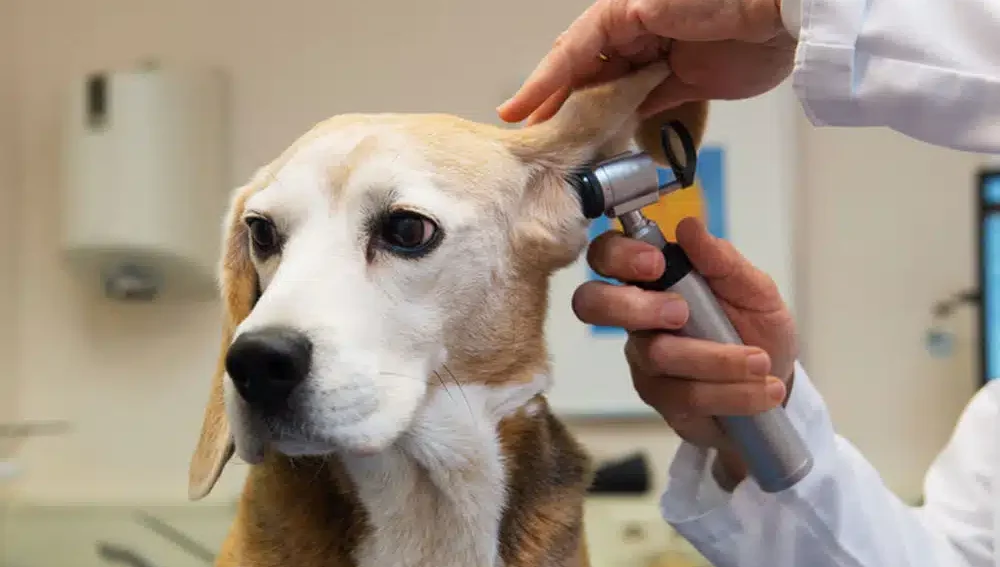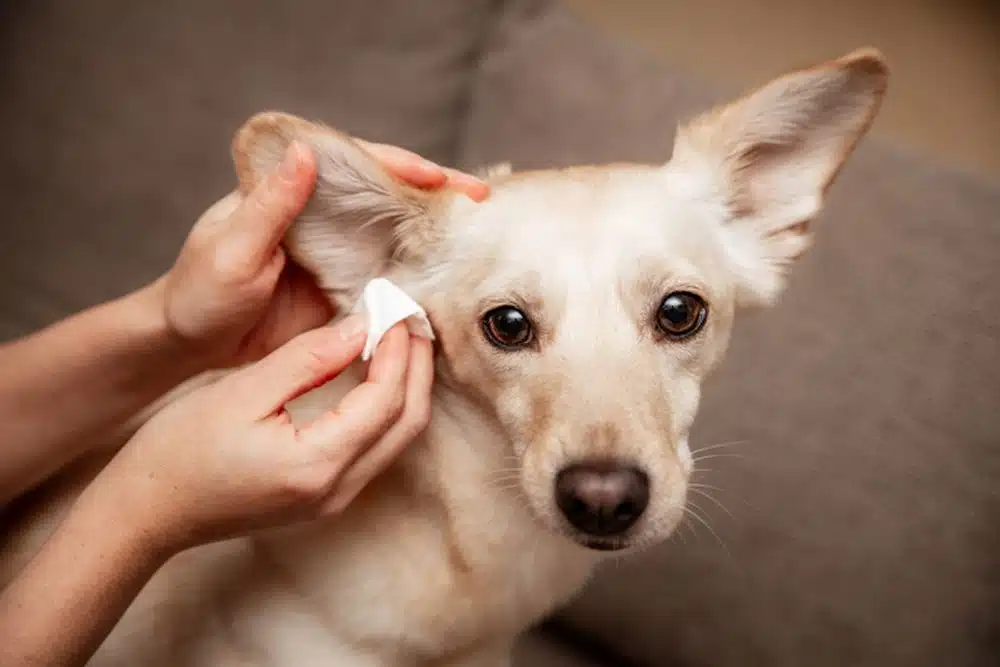
Stopping the Cycle of Canine Ear Infections
A foul odor, redness inside the ear, or constant head shaking are signs many dog owners know all too well. Ear infections can be painful and may return again and again if the underlying cause is not addressed. Allergies, moisture, or even structural issues in the ear canal may be to blame.
Harbor Pines Veterinary Center in Harbor City, CA, offers AAHA-accredited care, advanced treatments, and even mobile services to make relief and prevention easier for every family.
Why Ear Infections Happen: Allergies, Moisture, and More
Ear infections in dogs rarely occur without reason. Most cases stem from underlying conditions that create the perfect environment for bacteria and yeast to flourish.
Dog allergies rank among the most common culprits, causing inflammation that narrows the ear canal and traps moisture. When dogs scratch at itchy, inflamed ears, they create micro-wounds that welcome infection.
Moisture plays an equally significant role. Dogs with floppy ears or those who swim frequently face higher risks because trapped water creates ideal breeding conditions for harmful microorganisms. Some breeds have naturally narrow ear canals or excessive hair growth that prevents proper air circulation, making them prone to recurring infections.
Less obvious but equally important causes include hormonal imbalances. Conditions like hypothyroidism and Cushing’s disease compromise the immune system and alter skin chemistry, making dogs more susceptible to ear problems. These underlying conditions must be addressed for lasting relief, possibly through regular health exams.
How to Spot an Ear Infection Early
Early detection can prevent minor irritation from becoming a serious medical issue. Watch for these warning signs:
- A strong, unpleasant odor emanating from the ears.
- Visible redness or swelling inside the ear canal.
- Persistent head shaking or tilting.
- Many dogs will scratch at their ears excessively, sometimes to the point of creating wounds around the ear area.
- Brown, yellow, or black discharge often accompanies infections, and you might notice your dog seems uncomfortable when you touch their ears.
- Some dogs become reluctant to have their heads handled at all.
Recognizing these symptoms quickly helps prevent complications like ear hematoma, where blood vessels burst from excessive shaking and create painful swelling.
Smart Ear Care Strategies for a Healthier, Happier Dog
Healthy ears are a big part of your dog’s overall well-being. By building a routine that includes gentle cleaning, allergy management, and environmental awareness, you can help prevent painful infections and reduce the risk of recurring problems.
Regular Ear Cleaning
Proper ear maintenance forms the foundation of infection prevention. Learning how to clean your dog’s ears correctly can dramatically reduce infection frequency. Use only veterinary-approved ear cleaners, never water or household products.
Start by filling the ear canal with canine ear cleaner, then gently massage the base of the ear for 20-30 seconds. Allow your dog to shake their head naturally to help loosen debris, then use cotton balls or gauze to wipe away visible discharge. Never use cotton swabs, which can push debris deeper or damage delicate ear structures.
The key lies in gentle, consistent cleaning rather than aggressive scrubbing. Over-cleaning can actually irritate the ears and increase infection risk. Most dogs benefit from weekly cleaning, though some may need more or less frequent attention based on their individual needs.
Managing Allergies and Skin Conditions
Since allergies trigger many ear infections, addressing these underlying issues proves essential for long-term success. Environmental allergens like pollen, dust mites, and mold can cause year-round problems, while food allergies may require more detective work to identify.
Dermatitis and nutrition share complex relationships that affect ear health. Some dogs benefit from specialized diets that support skin barrier function and reduce inflammatory responses. Identifying food allergies often requires systematic elimination diet trials under veterinary guidance.
Omega-3 fatty acids, probiotics, and other supplements may help some dogs manage allergic responses more effectively. However, these approaches work best when combined with proper medical treatment and environmental management.
Environmental Considerations
Your local environment significantly impacts your dog’s ear health. In coastal areas like Harbor City, higher humidity levels can create challenges for dogs prone to ear problems. Salt air and beach sand can also irritate sensitive ears, especially after swimming sessions.
Be particularly cautious about foxtails and their impact during certain seasons. These grass seeds can work their way deep into ear canals, causing severe infections and requiring emergency removal. After walks in areas with tall grass, always inspect your dog’s ears for foreign material.
Effective Canine Ear Infection Treatment Options
Successful ear infection treatment requires accurate diagnosis of the specific organisms involved. What works for bacterial infections may prove useless against yeast overgrowth, and mixed infections require combination therapy. Topical medications often include antibiotics, antifungals, and anti-inflammatory components tailored to each case.
Severe or chronic cases may require oral medications to address systemic inflammation and infection. Some dogs need sedation for thorough ear cleaning and examination, especially when infections have caused significant pain and sensitivity. Surgical options provide solutions for dogs with recurring infections that don’t respond to medical management.
Advanced Veterinary Care
Professional veterinary evaluation provides crucial information that guides effective treatment. Ear cytology allows veterinarians to identify specific bacteria, yeast, or other organisms present in the ear canal. This microscopic examination ensures that medication is chosen based on evidence rather than assumption, targeting the actual cause of infection.
In more complex or recurring cases, your veterinarian may also recommend a culture and sensitivity test. This diagnostic tool grows and analyzes the microorganisms collected from the ear to determine exactly which bacteria are present and which antibiotics will be most effective. By combining cytology with culture results, veterinarians can create a treatment plan that addresses both the immediate infection and any underlying factors contributing to chronic ear disease.
Harbor Pines Veterinary Center offers comprehensive diagnostic capabilities to uncover underlying causes of recurring ear infections. From allergy testing to hormonal evaluations, thorough investigation often reveals treatable conditions that, when addressed, dramatically reduce infection frequency.
Why Catching Canine Ear Infections Early is Key

Ignoring ear infections or attempting inadequate home treatment can lead to serious complications. Otitis media and interna occur when infections spread to the middle and inner ear structures. These deep infections can cause permanent hearing loss, balance problems, and facial nerve paralysis.
Chronic infections can cause permanent changes to ear canal structure, making future infections more likely and harder to treat. The ear canal may become thickened and narrowed, creating ideal conditions for recurring problems.
Partnering with Your Veterinarian for Long-Term Ear Health
Regular health exams allow veterinarians to monitor ear health and catch problems early. Dogs with a history of ear infections benefit from more frequent check-ups, allowing for preventive interventions before full-blown infections develop.
A trusted veterinary relationship proves invaluable for managing chronic ear problems. Your veterinarian can track patterns, adjust treatments based on response, and coordinate care with specialists when needed.
Making Care More Accessible and Responsive
Modern veterinary care adapts to busy family schedules. Mobile services bring professional care directly to your home, reducing stress for anxious pets and making regular ear maintenance more convenient for families.
When ear problems arise, prompt professional attention prevents minor issues from becoming major complications. Request an appointment at the first sign of ear discomfort rather than waiting for infections to worsen.
Your Dog’s Comfort Starts with Professional Care
Breaking the cycle of recurring ear infections requires identifying and addressing underlying causes rather than simply treating symptoms. Whether your dog shows signs of a new ear infection, suffers from chronic ear problems, or needs preventive care guidance, professional veterinary evaluation provides the foundation for lasting relief.
Call Harbor Pines Veterinary Center at (310) 517-1832 if your dog has any ear infection symptoms. Our comprehensive diagnostic services and treatment options can help identify why infections keep returning and develop an effective prevention strategy tailored to your dog’s specific needs.
